IN Magazine talked with two of the producers of Rustin, the Netflix film that has Oscar buzz written all over it for lead actor Colman Domingo…
Rustin has already premiered at the Telluride Film Festival and will have its international premiere in Canada at the 2023 Toronto International Film Festival. The film transports its audience to the 1960s when gay civil rights leader Bayard Rustin pits himself against other civil rights leaders of the day with infighting and inner turmoil as he convinces Reverend Martin Luther King, Jr. to organize the March on Washington for Jobs and Freedom. Seen as a defining moment for Black Americans, the March on Washington put political pressure on congressional leaders and then-President Kennedy to pass meaningful legislation for civil and economic rights. It is also the famous event where King delivered his “I Have a Dream” speech to the world.
Oscar-winning producer Bruce Cohen (American Beauty) recruited Higher Ground’s Tonia Davis, former President Barack Obama and former First Lady Michelle Obama to produce Rustin. The film highlights the many achievements of openly gay Bayard Rustin as the designer and lead advocate for the March on Washington. Reduced to a background player due to his sexuality, Rustin is an important figure in the civil rights movement that too few have heard about. Now, the world will know his value through this biographical film. I was honored to attend TIFF this year and discuss Bayard Rustin’s impact with producers Bruce Cohen and Tonia Davis.
Before we begin, I’d love to know about the Telluride experience and how everyone is feeling going into TIFF as you prepare to present this wonderful film.
Cohen: The Telluride experience was pretty magical. It’s such a beautiful place and an incredible festival to begin with. It was the 50th anniversary of the festival, which was significant to us because four days earlier had been the 60th anniversary of the March on Washington. So we felt like we were hitting all the big markers there but the movie was beautifully received by the audience and by the preliminary reviewers that had a chance to look at it. That was very moving to us that they connected so deeply with the film. People were shocked that they hadn’t heard of [Bayard Rustin] and feel like they’re really happy that they have now. One of the highlights of my experience was that I talked to a group of high school film students that had traveled to Telluride from schools all over the country. Hearing them talk about how much the film meant to them, and how much Bayard and his struggle and triumph meant to them, was really moving. Kind of what it’s all about.
What struck me as I was looking at all the players that were involved in the production of this film is that you have queer representation from the top down. Director George C. Wolfe, writer Dustin Lance Black, the two of you, and Colman Domingo, the star of the film. How important was it for queer representation to be part of this production across the board?
Davis: You just named four or five people but there were tens and tens more who are queer and working on the film. To tell this story with George C. Wolfe and Colman Domingo is really a dream come true for any producer, gay, straight, or queer. George not only has his own lived experiences that he can bring, but he’s a historian of biographies and literally a Bayard Rustin scholar. Colman at the age that he is now, to get a chance to be number one on the call sheet and be in basically every single frame of the film he carried it on his shoulders. It’s high time in his career that he had that opportunity. He managed it beautifully both on screen and off in terms of showing dedication, passion, research, collaboration, and also leadership on set. So, how important is it that more than half the people are queer: I don’t think we look at it like that. We look at it as these are the most exceptional collaborators, many of them brought their own lived experiences to the film in one way or the other. We’re so grateful for all of it.
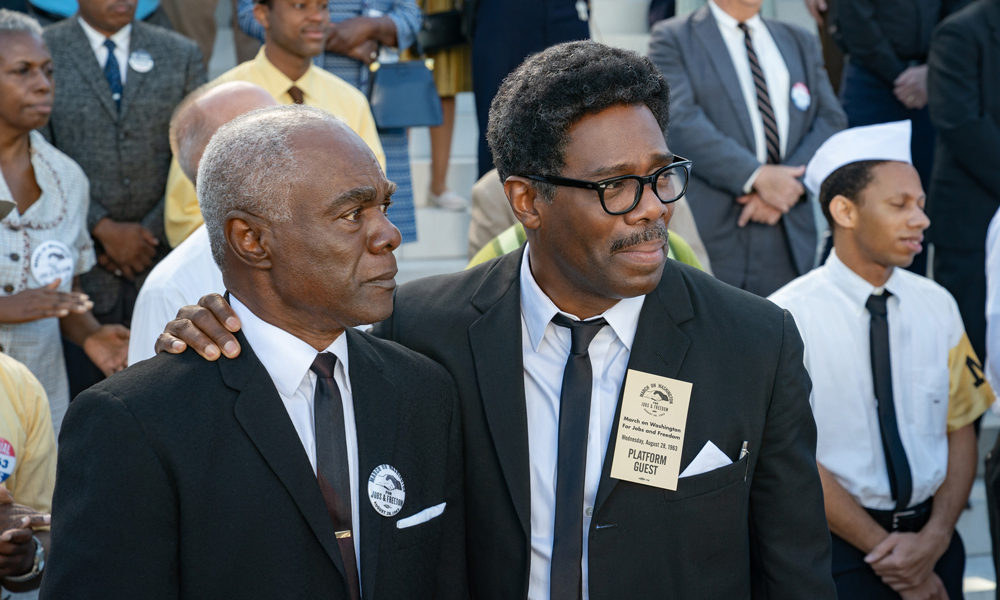
Speaking of the players behind the scenes, [Tonia] you’re a part of Higher Ground Productions. What was that process like for Higher Ground to come together with this film? Was it an idea on your end?
Davis: It was Bruce’s idea, actually! Bruce had been part of this project for many years. When Higher Ground started about five years ago, we were like every other producer in the world. We were looking for great projects, and we were looking for stories to tell with filmmakers and collaborators that we loved. Stories to tell that would make perfect sense obviously for the Obamas to sync up with their values and align with their dreams for this company. When Bruce called with this project, he’s a producer I’d always wanted to work with. He’s made some of my absolute favorite movies. He called and said, “I have a Bayard Rustin project with George C. Wolfe.” It was an immediate yes from me and the Higher Ground team. It’s been one of the easiest phone calls I’ve ever made to my bosses, who by the way are Barack Obama and Michelle Obama.
Cohen: [Dustin Lance Black] had brought me the script and asked me to come onboard to produce. We had taken it to George and we’ve been working on the project between the three of us for a while, and had come to learn very clearly that no one knew who Bayard Rustin was. Even people that should know who Bayard Rustin was, so when it came time to look for a new home, Higher Ground had just opened its doors about a month before. I remember clearly thinking, “Well, I know one person who knows who Bayard Rustin was and I was thinking of President Obama, because I knew that he had given Rustin the Presidential Medal of Freedom posthumously. That was the universe telling me that it was a good idea to send the script to Higher Ground.
I love synergy. Given the fact that President Obama honored Bayard Rustin with the Presidential Medal of Freedom, is it safe to say that this is a personal passion project for the Obamas at this point?
Davis: I think that it’s telling the story of progress in this country, and how it is made by everyday ordinary people who band together to do extraordinary things. Yes, I think it’s absolutely safe to say that that’s a passion of the Obamas. Certainly, I think their work speaks to that.
Cohen: I’ll also add that they’re very proud of the film, both of them.
That’s amazing to hear! Let’s shift gears to casting, not only Colman Domingo, but Chris Rock, Audra McDonald and this stellar cast. What was the casting process like?
Davis: George has a collection of artists that he has worked with. Colman is among them and Jeffrey Wright, Audra McDonald, Glen Turman are just a few of those artists. Michael Potts is another who played Cleve For George, a lot of it is thinking about the work that he’s created in the past. How these individual chemistry skill sets might fit together to tell this story. So the casting process was run by Avy Kaufman, our fantastic Casting Director, who many of us have worked with before. It came together beautifully.
The film portrays a side of civil rights leaders that we really haven’t seen before. The most obvious part of that is that Bayard Rustin is gay and his homosexuality relegates him to the background of history. He is Martin Luther King Jr.’s right-hand man, literally seen at the March on Washington behind and next to Dr. King. Rustin gives an impassioned speech about being born a Black man and also a gay man. What was the significance of having these elements shine through within the film?
Cohen: History gave us a gift with the civil rights movement because Bayard had been raised as a Quaker. He had a very different upbringing with a very different position towards homosexuality than almost everyone at that time. It’s one of the fascinating parts of his story. That was highly unusual but thank goodness for us and for history that that was the case because it allowed him to accomplish the great things that he accomplished. That line in the film, “On the day I was born Black, I was also born homosexual”: You either believe in freedom of justice for all or you do not. [It’s] not an exact quote out of his mouth, but very much his working principles that he based his life around. There are so few [gay people] who were alive at that time that would have ever had the strength and bravery to have an idea like that. That intersectionality seems more known now, but in 1963, literally unheard of.
What is one thing that you would like for audiences to walk away with after watching Rustin?
Davis: One thing that I think about a lot as a queer woman is that we were there. I really want young queer kids all over the world to be able to look in their history books, and when they don’t see themselves, know that we were there. And we did it.
I love that so much! Thank you to you both and good luck at TIFF! I’m excited for the world to finally get to see Rustin.

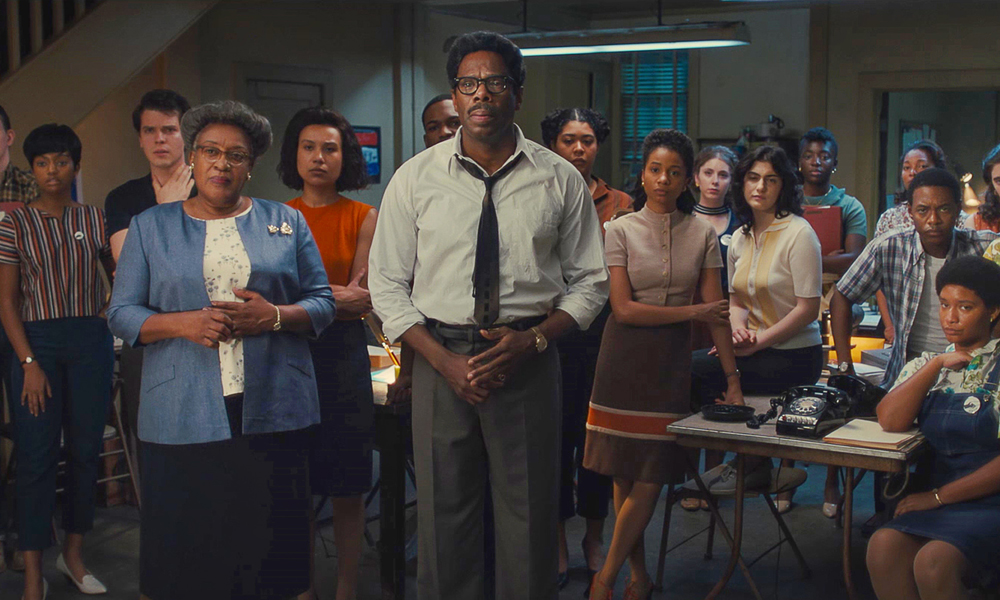
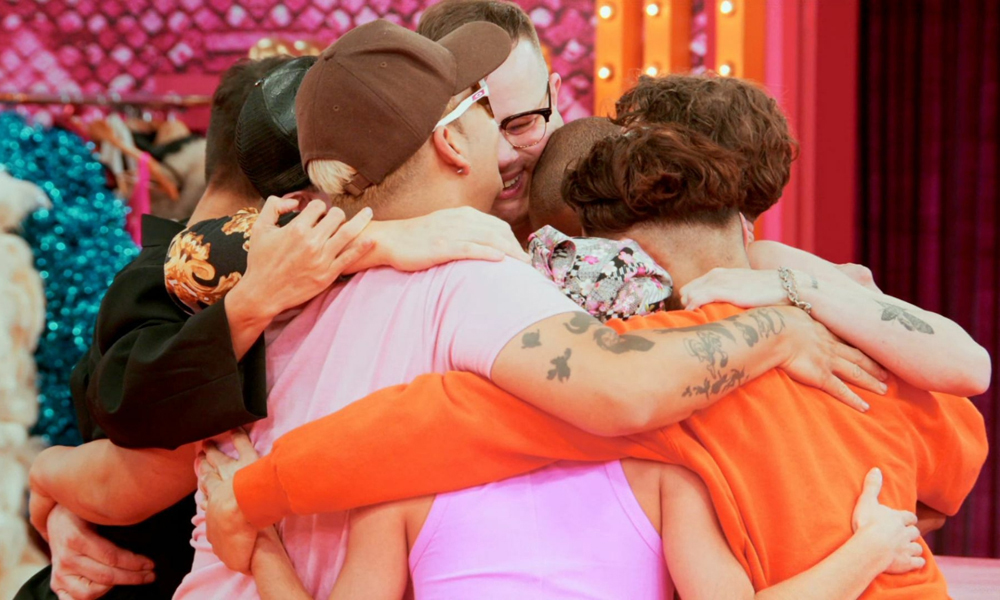
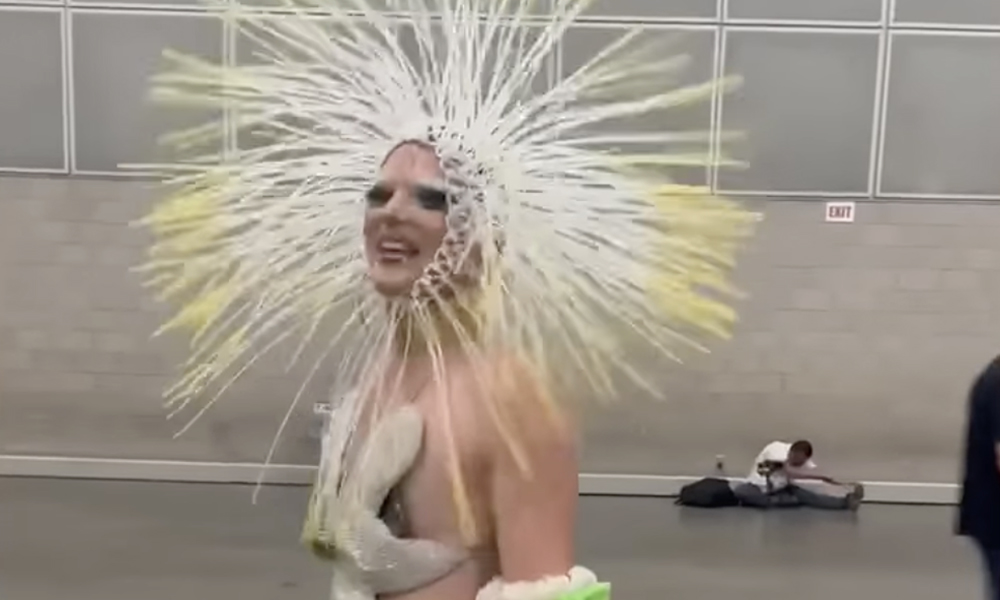
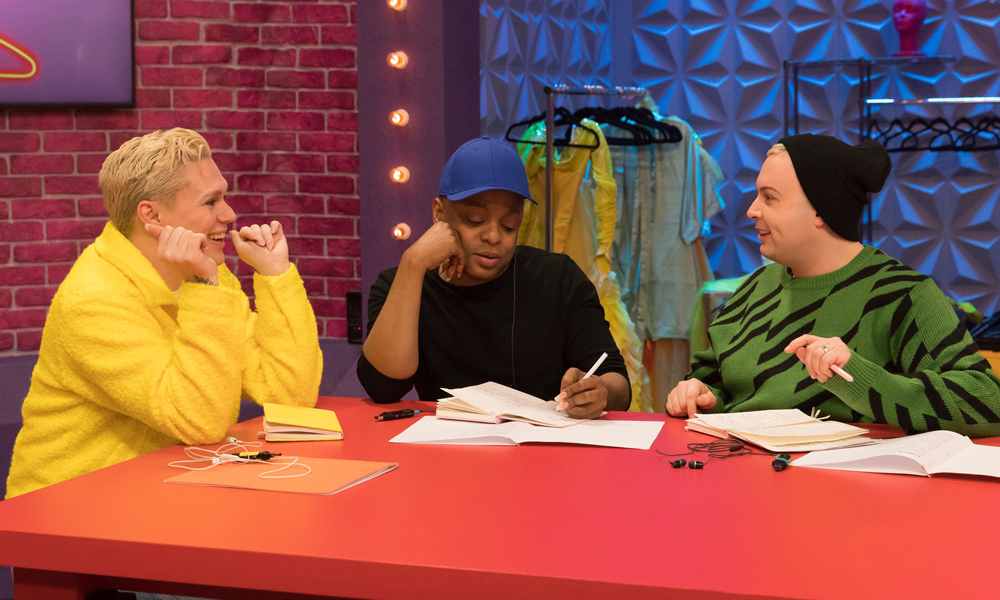

POST A COMMENT